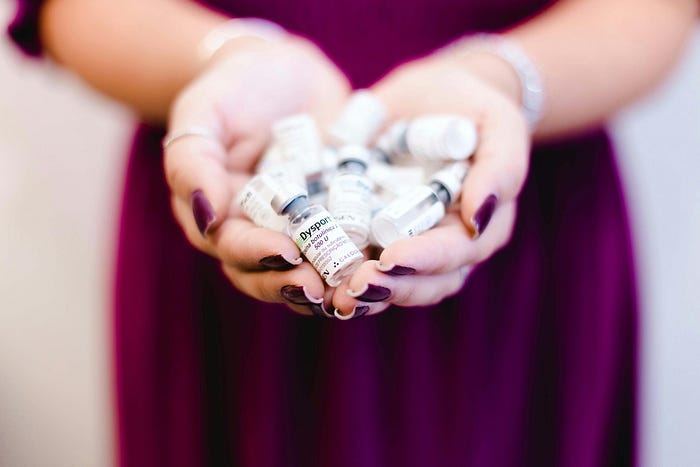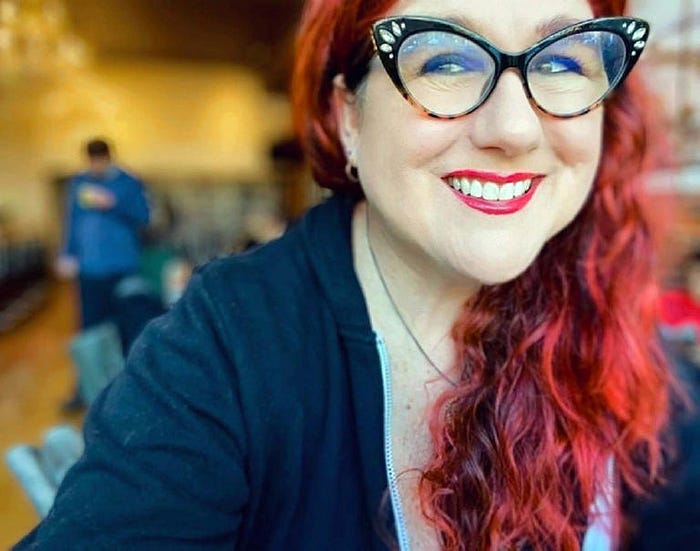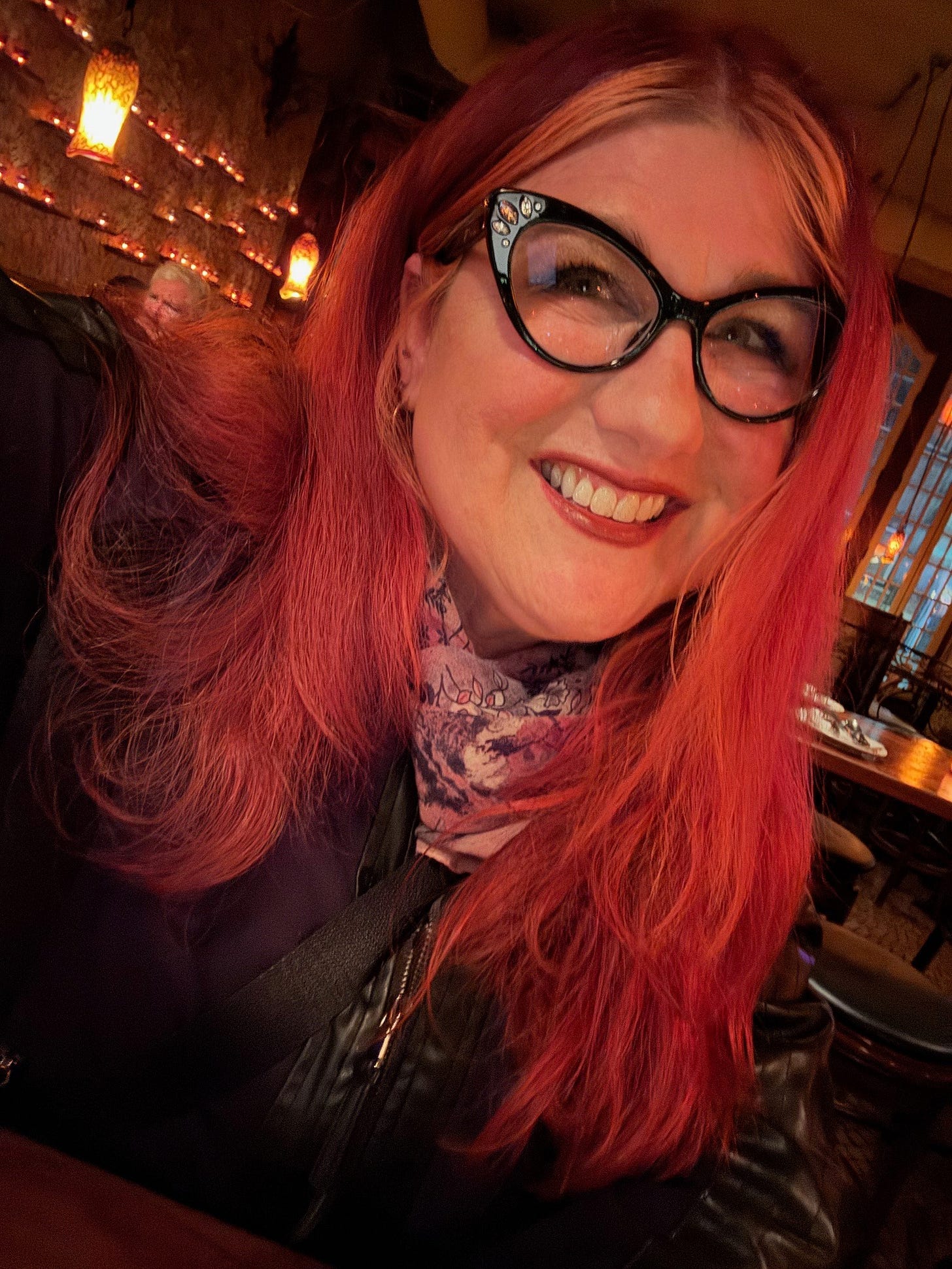I Got Botox. Does That Make Me a Hypocrite?
Reconciling self-acceptance with a little help from a syringe.

“All done!” proclaims Erin, my brand-new-to-me esthetician.
I smile and relax into her table. It’s covered in soft sheets and a heating pad, so I’m cozy as I simmer in a hazy parasympathetic response to the dozen injections she’s poked into my face. The pain was manageable, but I’m glad it’s over, and I tell her so.
“Oh good,” she says. “I wasn’t sure how you’d respond to your first time.”
“Well, I’ve had two c-sections. I was pretty confident I could handle a few jabs,” I joke.
She laughs, and I’m grateful — both for her humor and her competence during our appointment, as she explained and then performed new-to-me procedures: Dermaplane. Micropeel. Botox.
She holds up a mirror for me, and I stare back at my skin, rosy and radiant. I’m pleased.
“My skin thanks you,” I say.
“You’re welcome,” she replies. “You have thick skin.”
“Oh. Is thick… good?” I ask, unsure.
“It is. Skin thins as we age, but yours is nice and thick.”
“Okay, then,” I reply, relieved and also amused. I love when a turn of phrase is both literal and metaphorical.
“Thick-skinned, am I?” I chuckle to myself. “Oh, you have no idea.”
Last year my writing dream came true.
I made a New Year’s resolution to get a national byline. And boy, did it take resolve — pitching publications means a lot of rejection, or even worse, silence.
I hate being ignored.
Then I got the email I’d dreamed of, and I squealed. “Thanks for getting in touch! I’d love to have you write something about this…” it began. “This” was a pitch about the nascent Boysober movement and how it inspired me.
Then they told me they needed the story written in a day, and I panicked.
I had my first byline in TODAY.com — a dream, realized.
Then I discovered my story had been syndicated to MSN. Sweet — another byline, I thought. What could go wrong?
MSN still has comment sections on their articles. My story had 119 of them.
So many things went very wrong.
“The author is single because, well, just look at her.”
I was still glowing from the rush of my success. And here was the first of many virtual men, queuing up to tear me down.
“I could choose not to read these,” I muttered to my cat. She stared back, unfazed.
Of course I read them.
“Looking at your photo, I’m not so sure it’s a choice.”
“pretty sure she doesn’t have a choice.”
“Out there, somewhere, are men that unbeknownst to them should be thankful the author of this article has abstained from dating.”
“Based on that picture, it may last a lot longer than a month.”
“It’s a lie this one has to tell themself. I’m making the decision to be single, not that I’m completely unappealing.”
“I’m pretty sure she’d have trouble dating sober guys.”
“Guys taking one glance and then “nope”.”
“Maybe…you should have left your picture out of the article.”
The irony of these comments on a story about straight women who quit dating for their mental health wasn’t lost on me. But all the GenX irony in the world couldn’t erase the weight of that vitriol aimed at me — or more specifically, at my face.
Men aren’t accustomed to seeing photos of a 50-something woman associated with dating stories. It offends their sensibilities.
I offend their sensibilities, I thought.
I knew it was easier for them to demonize my appearance than to try to understand or even argue with my point of view. To many men, beauty is the only asset a woman has to offer. So of course that’s where they lobbed their insults.
My skin may be wrinkled, but it’s thick. If my face offends dudes in the comments, then so be it, I resolved. I wasn’t about to let a bunch of trolls diminish my joy.
I looked again at the photos I chose.
I like the way I look, I thought.
And I love that I’m a published author.
So how did I end up here, on this table with a forehead full of botulism?
It’s not because of those hateful trolls in the comments. Men on the Internet are indiscriminate with their insults. I’ve seen them declare Margot Robbie mid and Selena Gomez fat. A few fewer wrinkles on my imperfect face isn’t going to change their minds.
No, I’m here because of Milady Decollette.
Milady Decollette was born in 1915 of dubious parentage, a brainchild of marketing execs at Gillette and the Suffragette-empowered feminists heading into the Flapper era with freshly exposed arms. Gillette capitalized on this daring style by telling women they shouldn’t dare be seen with unsightly hairs under or on their arms.
Milady was the first razor marketed to women.
She made smooth all the rage.
Once the most bold and fashionable women started shaving, the modern hair removal industry was born.
We’ve long since transcended Milady. Now we women shave, wax, laser, sugar, thread, tweeze, and zap away our offending follicles. We can’t have hair on our legs, arms, bikini lines, armpits, or heaven forbid, anywhere on our faces, other than proper spots on our eyebrows — and those spots shift every decade, so if you came of age in the wrong era (hello 90s), you’ll likely want to microblade those brows. You definitely need to extend your eyelashes.
I don’t begrudge women wanting to look their best. It feels good, looking good. But once norms get established, it’s no longer just a personal choice. It’s societal expectation.
And then we all need to keep up — or pay the price of falling behind.
Try being a woman at the beach, or on the Internet, with unshaven legs.
Try being a woman at a job interview without makeup, or with grey hair. Or an actress at an award show without makeup.
Try showing up for a new sexual partner without waxing. I had one who balked, stunned. I asked him what was wrong. “I’ve just never seen a woman with hair there,” he replied. This man was well into his 30s, and he was gobsmacked by pubic hair. I was horrified, but also, I knew he wasn’t the only one to blame. Women had enabled him. Brazilian waxes were all he’d ever known.
Being natural is weird. It’s newsworthy. It’s taking a feminist stand.
It’s no longer normal.
I blame Milady.
I’m sure she wasn’t the first to shame women for their bodies in the name of capitalism. But she personifies the vicious cycle of feminine beauty standards. Once one of us takes on a new beauty regimen, it becomes a norm.
Then those of us who want to opt out, can’t — unless we want to defy norms.
So we invest immoderate amounts of money, even as we still earn only 79 cents to the male dollar. We endure painful treatments. We spend hours of our wild and precious lives. And we make ourselves look better, all to appease the never-ending norms of Milady.
That’s how I ended up on Erin’s table. At 54, it was time to face up to the fact that I’d fallen behind on aging beauty norms.
It was time to get caught up — by getting stuck.
I didn’t tell my two teen daughters about the Botox. It wasn’t a secret. I just wasn’t sure what to say.
My goal has always been to embolden my daughters to own their beauty and move through the world with confidence. I’ve tried to protect them from draconian beauty standards and raise them to believe all bodies are beautiful, even as they’ve learned from their peers and social media that well, that probably isn’t how the world is going to treat them.
I want them to know they’re so much more than their looks, even as I see the world punish — or worse, ignore — me for my aging appearance.
It’s all a paradox, an unsolvable parenting puzzle.
Unlike me, my eldest is gorgeous, someone who turns heads with an insouciant elegance I’ve never possessed. Her beauty seems effortless.
But it’s not. She’s obsessed with extravagant skin care and makeup. It makes me angry that the expectations on young women are massive and the costs, excessive. But who am I to tell her not to invest in these products, when I know her beauty will take her far, potentially even further than her considerable brains and talents?
I think of my daughters as I recall the needles sliding into my forehead and around the corners of my lined eyes. Am I setting the right example for them? How can I explain the nuance of believing we’re not defined by our beauty, even as I mourn how mine is fading, and the frustrations I feel at the expectations we girls and women hold ourselves to — especially while partaking in such an invasive procedure myself?
Parenting young women is a wild ride, not for the faint of heart.
Nor the thin-skinned.
I like the way I look.
I’ve always been more of a niche taste — and that’s fine. I’ve long made my peace with it. My tastes in men run a bit offbeat too, and I like to think my looks appeal to the right sort of fella.
So long as I don’t want anything from the world, I’m content with how I look.
I prefer to spend my energy developing other aspects of myself — my career, my friendships, my writing habit, my singing hobby. Cooking. Taking care of my little old brick home. Seeing live music. Caring for my kids and pets. It’s a good life.
But the thing is: I do need things from the world.
I need to stay employed. And the job market is wildly ageist. Since turning 40, I’ve never gotten through a job interview loop that didn’t include at least one same-age peer. At my current employer, I’m always the oldest one in the room, usually by some distance. Can I afford to look tired or unattractive?
I’d like to find a boyfriend, possibly even a partner. I’ve had various online dating profiles over the past year. I’ve messaged with countless men. I’ve met a dozen or so. I’ve kissed a few.
But so far, the Venn Diagram of men who I find attractive, who find me attractive, and who are monogamous, brainy, liberal, and local forms two singular circles.
No overlap. No matches.
Dating in midlife means adjusting expectations. Charm, wit, and emotional availability run in short supply. So when I matched with Jay — a tall, professional guy who asked insightful questions — I felt hopeful. We had shared interests. He was even a Magnetic Fields fan! When he asked me out, I was delighted.
“Should we meet for dinner? A cocktail? Tea or coffee?” I asked.
“Let’s meet for tea,” he chose. Odd, since it was dinnertime, but I hustled down to Miro Tea and found him waiting outside. I noted how cute he was as we hugged our hellos.
“You don’t really want tea, do you?” he asked.
“No,” I laughed, assuming he meant we’d grab a real drink or dinner instead.
“Good,” he said, sitting down. On a cold autumn night. Outside. With no tea.
Still, we had a great conversation. Turns out, Jay is another agnostic Jew with a writing practice, like me. But after 40 minutes, he made a lame excuse and left. So I took myself out to dinner. Over Lebanese tacos, I mulled how I’d finally met an attractive, intellectual equal — only to be left in the cold.
Beauty may be skin deep, but attraction is a ruthless gatekeeper. Maybe Jay and I could have connected on humor, culture, and shared neuroses, but none of that mattered.
Even thick skin like mine couldn’t protect me from the truth.
I wasn’t his cup of tea.
I don’t want you to think I suffer from low self-esteem.
I’m confident.
I know I’m a catch.
I’m also blessed with higher-than-average reasoning and problem solving skills, and a whole lot of lived experience. So I know my sense of self-worth only gets me so far. Sure, confidence is a turn-on. But it can’t transcend beauty standards, not really.
In dating, we’re all just meat-sacks, seeking the kinds of meat-sacks we like. It’s okay to have preferences. I’ve swiped left on my fair share of men who seemed clever and kind and cool, simply because I didn’t find them attractive. I know many have done the same to me.
Being a beauty outlier just limits the number of meat-sacks who may consider, um, rubbing their sacks on mine.
To put it in marketing terms: the pipeline of dateable straight men in my age range is already limited. If I can increase the number of interested men at the top of the funnel, surely my odds for finding partnership increase, right?
But what levers can I pull to increase men’s interest in me?
I can’t get younger.
But I can look a bit younger. If my looks align more with modern beauty standards, I’ll appeal to a broader swath of men — and hopefully, at least one of those men will likewise appeal to me.
It’s a question of numbers and needles.
I can’t argue with math. Hence, the jabs.
Yes, beauty treatments are extremely expensive.
But what’s the cost of not buying into them?
That seems higher.
I wasn’t surprised I barely felt the tiny needles puncture my skin.
But I was surprised to find I can feel the medication inside me.
Botox is a reassuring weight, lingering like a gentle hand on the curvature of my forehead, reminding me not to make outrageous expressions. My face isn’t frozen. I remain an expressive talker. But the Botox lingers like a comforting reminder.
I find it strangely soothing.
Progress is subtle, but then so is altering how one feels in one’s 54-year-old skin.
It’s good to know mine is thick, but still pliable.
It took two days for my gorgeous French neighbor friend Dominique to notice. “Dana!” she exclaimed when we ran into each other at the dog park. “Your skin looks gorgeous.”
It took five days for a coworker to notice. “You look so good since you came back from break,” she raved. “I really think 2025 is going to be your year!”
I just smiled.
After 10 days, my eldest daughter eyeballs me at the kitchen table. I’m freshly out of the shower, with my wet hair pulled back and no makeup. “Your skin looks really good,” she says.
Then she leans in for a closer look. “Mom… your forehead??!” With this, her eyebrows cock with an unstated question. I won’t lie to her.
“I got Botox,” I tell her, bracing myself for her reaction. Her eyes open wide, with approval. “It looks amazing,” she gushes.
I don’t know how to tell her all the ways in which we women need to toughen up to face this world, and how expensive, and painful, and cruel it can all be. I don’t know how to explain that I can oppose these unfair standards and still participate in them, because fighting them alone is exhausting.
“You can’t protect her,” Milady calls to me. “But she understands more than you realize.”
“What do you mean?”
“She sees you taking care of yourself. She thinks you look amazing. Now show her you own your choices.”
So I take her compliment at face value.
“Thanks, sweetie — that means a lot,” I tell her.
And she’s right.
I do look amazing.
I like the way I look — maybe even a bit more than I did before.
*Name changed for privacy.
Greetings!
I’m Dana DuBois, a GenX word nerd living in the Pacific Northwest with a whole lot of little words to share. I’m a founder and editor of three publications: Pink Hair & Pronouns, Three Imaginary Girls, and genXy. I write across a variety of topics but parenting, music and pop culture, relationships, and feminism are my favorites. Em-dashes, Oxford commas, and well-placed semi-colons make my heart happy.
If this story resonated with you, why not buy me a coffee?
(Make mine an iced oat milk decaf mocha, please and thank you.)





Yes, the world 🌎 is full of cruel and idiotic people! Dana you look fantastic, don’t worry about all those men who avoided you or those fucking morons who dissed you on Social Media! You are an excellent writer and a beautiful woman and if your daughter’s turn out to be anything like you, they should consider themselves lucky! It’s still a man’s world, so far, but the pendulum swings back and forth between beauty standards, eventually it will swing back to common sense! To see people, especially women in the same way they see themselves! Probably a long way off, still it will change! Everything is Temporary! Except, hopefully, having someone like you around to remind us all about actual beauty! Stay Strong and Safe! 👍👍👍🐕📚☕️🍩